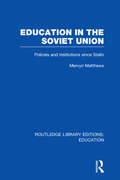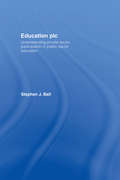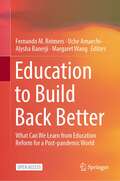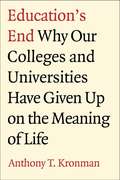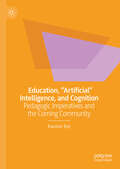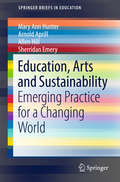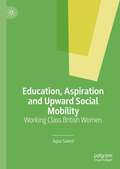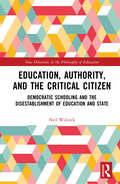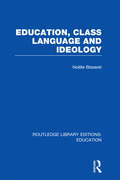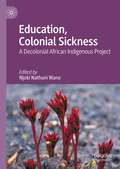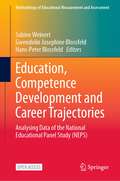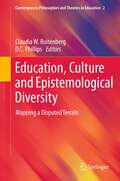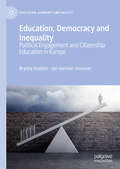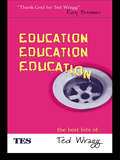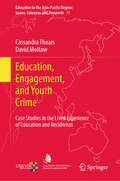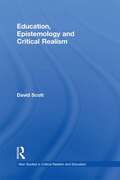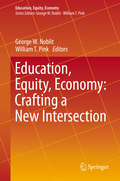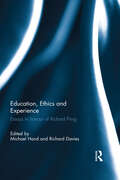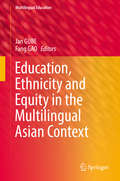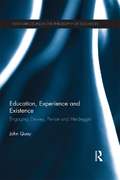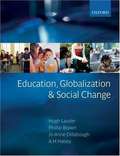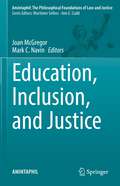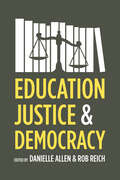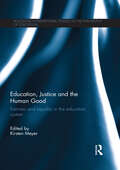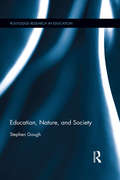- Table View
- List View
Education in the Soviet Union: Policies and Institutions Since Stalin (Routledge Library Editions: Education)
by Mervyn MatthewsThis book provides a comprehensive survey of the successes and failures of education and training in the Khrushchev and Breshnev years. The author gives an objective assessment of the accessibility of the main types of institution, of the contents of courses and of Soviet attempts to marry the functioning of their education system to their perceived economic and social needs. In addition the book has many useful and original features: For ease of analysis it summarises in diagram form complex statistics which are not usually brought together for so long a time period. It provides a systematic account of educational legislation; Matthews’ comparison of series of official decrees will allow subtle shifts in government policy to be accurately charted. Particular attention is also paid to a number of issues that are often neglected: the employment problems of school and college graduates; the role and professional status of teachers; political control and militarisation in schools; the close detail of higher education curricula; and the rate of student failure. Of special value is the chapter on those educational institutions which are often omitted from Western studies and which are hardly recognised as such in most official Soviet sources.
Education plc: Understanding Private Sector Participation in Public Sector Education
by Stephen J. BallIs the privatisation of state education defendable? Did the public sector ever provide a fair education for all learners? In Education plc, Stephen Ball provides a comprehensive, analytic and empirical account of the privatisation of education. He questions the kind of future we want for education and what role privatisation and the private sector may have in that future. Using policy sociology to describe and critically analyse changes in policy, policy technologies and policy regimes, he looks at the ethical and democratic impacts of these changes and raises the following questions: Is there a legitimacy for privatisation based on the convergence of interests between business and the ‘third way’ state? Is the extent and value of private participation in public education misunderstood? How is the selling of private company services linked to the remodelling of schools? Why have the technical and political issues of privatisation been considered but ethical issues almost totally neglected? What is happening here, beyond mere technical changes in the form of public service delivery? Is education policy being spoken by new voices? Drawing upon extensive documentary research and interviews with senior executives from the leading ‘education services industry’ companies, the author challenges preconceptions about privatisation. He concludes that blanket defence of the public sector as it was, over and against the inroads of privatisation, is untenable, and that there is no going back to a past in which the public sector as a whole worked well and worked fairly in the interests of all learners, because there was no such past. This book breaks new ground and builds on Stephen Ball’s previous work on education policy. It should appeal to those researching and studying in the fields of social policy, policy analysis, sociology of education, education research and social economics.
Education to Build Back Better: What Can We Learn from Education Reform for a Post-pandemic World
by Fernando M. Reimers Uche Amaechi Alysha Banerji Margaret WangThis open access book examines the implications of the COVID-19 Pandemic for education systems and argues that major education reforms will be necessary, particularly in the Global South, to address the learning loss caused by the pandemic. To inform those reforms, knowledge about the implementation reforms in the Global South is necessary, and such knowledge is seriously lacking as the existing literature on the implementation of educational change focused principally in reforms in countries in the Global North. This book contributes to address this gap by examining five major education reforms in India, Egypt, Taiwan, Vietnam, and Senegal, and by presenting two novel approaches to climate change education using a bottoms up strategy of reform. The chapters examine the implementation process drawing on a theoretical model of educational change by Reimers (published in Educating Students to Improve the World by Springer in 2020). The book concludes discussing the implementation of such reforms as an evolutionary and learning process, characterized by four dimensions: the goals of the reform, the drivers of the reform, the reform strategy, and the mindsets about educational change which undergird the implementation strategy.
Education's End: Why Our Colleges and Universities Have Given Up on the Meaning of Life
by Anthony T. KronmanThe question of what living is for-of what one should care about and why-is the most important question a person can ask. Yet under the influence of the modern research ideal, our colleges and universities have expelled this question from their classrooms, judging it unfit for organized study. In this eloquent and carefully considered book, Tony Kronman explores why this has happened and calls for the restoration of life's most important question to an honored place in higher education. The author contrasts an earlier era in American education, when the question of the meaning of life was at the center of instruction, with our own times, when this question has been largely abandoned by college and university teachers. In particular, teachers of the humanities, who once felt a special responsibility to guide their students in exploring the question of what living is for, have lost confidence in their authority to do so. And they have lost sight of the question itself in the blinding fog of political correctness that has dominated their disciplines for the past forty years. Yet Kronman sees a readiness for change--a longing among teachers as well as students to engage questions of ultimate meaning. He urges a revival of the humanities' lost tradition of studying the meaning of life through the careful but critical reading of great works of literary and philosophical imagination. And he offers here the charter document of that revival.
Education, "Artificial" Intelligence, and Cognition: Pedagogic Imperatives and the Coming Community
by Kaustuv RoyThis book initiates fresh pedagogic thinking on the nature of intelligence and human potentiality in the midst of a rising panic over so-called artificial intelligence. At the rate of current advancement, entire social and cultural landscapes including education and work are going to change in unprecedented ways in the near future. In light of these developments, the author sets out to critically assess the role of education in creating the capacity to distinguish between machinic &“intelligence&” and organic intelligence, thus helping us move from passive acceptance to active becoming.
Education, Arts and Sustainability: Emerging Practice For A Changing World (SpringerBriefs in Education)
by Arnold Aprill Mary Ann Hunter Allen Hill Sherridan EmeryThis book addresses this challenge by proposing an integration of sustainability and arts education in both principle and practice. In a global context of intensifying social, economic and environmental crises, education is key to raising awareness and motivating individuals and communities to act in sustaining life in our more-than-human world. But how is this done when the complexity and need for change becomes overwhelming, and schooling systems become complicit in supporting the status quo?Drawing on critical education theory and precepts of creativity, curiosity and change, it documents a series of case examples that demonstrate how five principles of Education for Sustainability - critical thinking, systems thinking, community partnership, participation, and envisioning better futures - are found at the heart of much arts practice in schools. Featuring the creative work and voices of teachers working in arts-based enquiry and diverse community-engaged contexts, the book investigates how sustainability principles are embedded in contemporary arts education thinking and pedagogy. The authors are unapologetically optimistic in forming an alliance of arts and sustainability education as a creative response to the challenge of our times, arguing that while they may have operated on the margins of conventional pedagogy and curriculum, they have more than marginal impact.
Education, Aspiration and Upward Social Mobility: Working Class British Women
by Aqsa SaeedThis book explores the career aspirations, achievements and consequent social mobility of a group of British Pakistani women. It uses Bourdieu’s concept of cultural capital to analyse how these women, living in a segregated Pakistani community located in a deprived northern town in the UK with poor employment opportunities, acquired the resources to pursue further and higher education, obtain qualifications and enter professional careers. The author discusses and analyses how cultural capital features in homes, schools and workplaces, as well as how the women navigate and modify intersecting gender, ethnic and class identities in order to create specific career trajectories. Illuminating the rich intersections of biography, history and society, the author captures important qualitative data which acts as a microcosm for contemporary discussions on social mobility, multiculturalism, Muslim communities, race, and gender in Britain.
Education, Authority, and the Critical Citizen: Democratic Schooling and the Disestablishment of Education and State (New Directions in the Philosophy of Education)
by Neil WilcockThis book offers a unique analysis of the tension between the individual and society in educational contexts, and the role that citizenship and democratic education can play. It approaches the question from two different perspectives – the institutional and the interactional – and argues that any solution must answer the tension from both or it will necessarily fail. The answer is found through a political methodology that places education at the centre and concludes that a balance can be found if we embrace the federated disestablishment of education and state and internally democratic schooling that aims to realise the emancipation of the political child. The book situates itself in the tradition of political philosophy that is education focused, identifying an unresolved tension between the individual and society in the works of Rousseau, Dewey, and Freire. It discusses the concept of authority as a primary issue persisting in this tension. It does so by exploring both interactional and institutional responses based on the idea of the free individual and cooperative associations. The author advocates an education system that creates the necessary space for the cultivation of the free individual and is run by the principles of internally democratic schooling. With a strong focus on citizenship and the role of education in the development of social justice-oriented citizens, this book will be of great interest to researchers, academics, and postgraduate students in the fields of philosophy of education, political philosophy, educational theory, and citizenship education.
Education, Class Language and Ideology (Routledge Library Editions: Education)
by Noelle BisseretThis book presents an analysis of the ‘essentialist ideology’, which is inherent to class-based societies. The author argues that essentialist ideology is efficient through its unconscious component and is imposed on everyone. It guides school selection and imposes on each class a language specific in its reference to concrete domination relations. It even unbalances the scientific objectivity of researchers in the social sciences, not only among those who abide by the theory of natural aptitudes, but also among its sharpest critics, such as Basil Bernstein, Pierre Bourdieu and J C Passeron, whose work is considered in this book.
Education, Colonial Sickness: A Decolonial African Indigenous Project
by Njoki Nathani WaneIn the last two decades, we have witnessed the quest for decolonization; through research, writing, teaching, and curriculum across the globe. Calls to decolonize higher education have been overwhelming in recent year. However, the goal of decolonizing has evolved past not only the need to dismantle colonial empires but all imperial structures. Today, decolonization is deemed a basis for restorative justice under the lens of the psychological, economic, and cultural spectrum. In this book, the editor and her authors confront various dimensions of decolonizing work, structural, epistemic, personal, and relational, which are entangled and equally necessary. This book illuminates other sites and dimensions of decolonizing not only from Africa but also other areas. This convergence of critical scholarship, theoretical inquiry, and empirical research is committed to questioning and redressing inequality in contemporary history and other African studies. It signals one of many steps in a bid to consultatively examine how knowledge and power have been both defined and subsequently denied through the sphere of academic practice.
Education, Competence Development and Career Trajectories: Analysing Data of the National Educational Panel Study (NEPS) (Methodology of Educational Measurement and Assessment)
by Hans-Peter Blossfeld Sabine Weinert Gwendolin Josephine BlossfeldThis Open Access book presents the results of an interdisciplinary research program to utilize data from the multicohort German National Educational Panel Study (NEPS), which included over 100.000 participants in six nationally representative panel studies. Renowned researchers from the fields of sociology, psychology, educational science, economics, and survey methodology have used the (longitudinal) data for their substantive and/or methodological questions and present important results of their research projects. This edited volume contains contributions from the following four topics: (1) Competence Development: Individual Characteristics, Learning Environments, and other Contextual Factors, (2) Educational Transitions and Pathways: Influencing Factors and Outcomes, (3) Vocational Training and Labour Market, and (4) Individuals with Migration Background. It provides essential insights for researchers, postdocs, PhD students, and university students of different scientific disciplines interested in educational sciences as well as for policy makers who have to deal with educational problems in modern societies.
Education, Culture and Epistemological Diversity
by Claudia W. Ruitenberg D. C. PhillipsIn the recent educational research literature, it has been asserted that ethnic or cultural groups have their own distinctive epistemologies, and that these have been given short shrift by the dominant social group. Educational research, then, is pursued within a framework that embodies assumptions about knowledge and knowledge production that reflect the interests and historical traditions of this dominant group. In such arguments, however, some relevant philosophical issues remain unresolved, such as what claims about culturally distinctive epistemologies mean, precisely, and how they relate to traditional epistemological distinctions between beliefs and knowledge. Furthermore, can these ways of establishing knowledge stand up to critical scrutiny? This volume marshals a variety of resources to pursue such open questions in a lively and accessible way: a critical literature review, analyses from philosophers of education who have different positions on the key issues, a roundtable discussion, and interactions between the two editors, who sometimes disagree. It also employs the work of prominent feminist epistemologists who have investigated parallel issues with sophistication. This volume does not settle the question of culturally distinctive epistemologies, but teases out the various philosophical, sociological and political aspects of the issue so that the debate can continue with greater clarity.
Education, Democracy and Inequality: Political Engagement and Citizenship Education in Europe (Education, Economy and Society)
by Jan Germen Janmaat Bryony HoskinsThis book posits that national education systems are enhancing socioeconomic inequalities in political engagement. While the democratic ideal is social equality in political engagement, the authors demonstrate that the English education system is recreating and enhancing entrenched democratic inequalities. In Europe, the UK has the strongest correlation between social background and voting behaviours. Examining the role of the school and the education system in the potential reproduction of these inequalities, the authors draw upon the theories of Bourdieu and Bernstein and compare the English school system to other European countries to analyse barriers that are put along the way to political engagement. In times of political disaffection, frustration and polarisation, it is particularly important to uncover why young people from disadvantaged backgrounds are less likely to engage politically, and to help inspire future generations to use their voice. This timely book will be of interest and value to students and scholars of educational inequality and political engagement.
Education, Education, Education: The Best Bits of Ted Wragg
by E. C. WraggWhen New Labour came into office in 1997, its commitment to 'education, education, education' captured the imagination of the public. This collection of humorous articles by Ted Wragg between 1998 to 2003 exposes the real state of education during this period, when educational policy was never far from the headlines. No one escapes Ted's sharp-shooting wit: from the 'blamers and shamers' who try to turn teacher-bashing into a national pastime to the 'pale policy wonks' in the Department of Education, who issue regular hare-brained initiatives from the mysterious 'Tony Zoffis'. Split into seven issue-focused chapters, this hilarious collection will be a tonic for anyone finding themselves unsure whether to laugh or cry about recent developments in the world of education.
Education, Engagement, and Youth Crime: Case Studies in the Lived Experience of Education and Recidivism (Education in the Asia-Pacific Region: Issues, Concerns and Prospects #71)
by Cassandra Thoars David MoltowThis book presents insights into how affective educational experiences may be associated with youth criminal behaviour and the pathway to recidivism. It explores the perspectives and lived school experiences of five young adult male prison inmates, including while they were incarcerated as youths. Through these case studies, the book explores the relationship between affective engagement in education and recidivism.This book shows that participants were affectively disengaged from education prior to their initial incarceration in a youth detention facility, and that their disaffection before, during, and after youth incarceration both generated and impacted on their cognitive and behavioural disengagement from education. Moreover, a range of additional factors not directly causally related to their schooling were shown to have had a significant effect on their engagement in education. The book considers a number of key findings. First, the foundational role that a sense of belonging plays in how young people experience education and its relation to crime. Second, the importance of individualized transition plans for youth at risk, and youth offenders before, during, and after incarceration. Third, the extent to which successful transition from youth offending and recidivism hinges on interagency collaboration. This book will be beneficial to teacher educators, education researchers, criminologists and sociologists.
Education, Epistemology and Critical Realism (New Studies in Critical Realism and Education (Routledge Critical Realism))
by David ScottThis book addresses fundamental questions in relation to education and its epistemology. The position taken by the author is critical realist; and thus throughout the relationship between education and critical realism is foregrounded. Themes and issues that surface at different times in the book are: a critical realist view of education research; a resolution of the quantitative/qualitative divide; criteria for judging the worth of educational texts and practices; differences between scientific and critical realisms; empirical research methods in education; structure-agency relationships; pragmatist views of educational research; foundations and paradigmatic differences; and educational critique and transformation.
Education, Equity, Economy: Crafting a New Intersection
by George W. Noblit William T. PinkThis volume will introduce the readers to an alternative nexus of education, equity and economy, pointing to economies and educations that promote a less stratified and exploitive world, and as the chapter authors demonstrate, this view has a wide range of applications, from technology, mathematics, to environmental catastrophes and indigenous cultures. This first volume in the new book series not only introduces the series itself, but also several authors whose chapters that appear here presage the in-depth analysis that will be offered by their volumes in the series. Education is invoked repeatedly in the 'class warfare' that pits the population against the elites as the investment that makes the difference, in terms of both policy and individual commitment, in the economy. The economy in this scenario is competitive, accumulative, exploitive and stratifying, implying education should mirror this and prepare people to fit this economy. However, education has other historic goals of developing common cultures, national identities, and civic engagement that belie this form of economic determinism. This volume and the series will explore this new nexus of economy and education with equity.
Education, Ethics and Experience: Essays in honour of Richard Pring
by Richard Davies Michael HandEducation, Ethics and Experience is a collection of original philosophical essays celebrating the work of one of the most influential philosophers of education of the last 40 years. Richard Pring’s substantial body of work has addressed topics ranging from curriculum integration to the comprehensive ideal, vocational education to faith schools, professional development to the privatisation of education, moral seriousness to the nature of educational research. The twelve essays collected here explore and build on Pring’s treatment of topics that are central to the field of philosophy of education and high on the agenda of education policy-makers. The essays are by no means uncritical: some authors disagree sharply with Pring; others see his arguments as useful but incomplete, in need of addition or amendment. But all acknowledge their intellectual debt to him and recognise him as a giant on whose shoulders they stand. This book will be a welcome and lively read for educational academics, researchers and students of Educational Studies and Philosophy.
Education, Ethnicity and Equity in the Multilingual Asian Context (Multilingual Education #32)
by Jan Gube Fang GaoThe book addresses issues related to the education of ethnic minority individuals in the multilingual Asian region. It features recent research and practices of scholars aiming to rethink educational policy and practice surrounding the education of ethnic minority students with a variety of language scenarios in Hong Kong and other Asian contexts. It documents how ethnicity and inequality are played out at policy, school, and individual levels, and how these affect the education of ethnic minorities in their host societies. Using a range of methods, from surveys to interviews and document analysis, this book describes the links between language, identity and educational inequality related to ethnic minorities in Asian contexts.
Education, Experience and Existence: Engaging Dewey, Peirce and Heidegger (New Directions in the Philosophy of Education)
by John QuayEducation, Experience and Existence proposes a new way of understanding education that delves beneath the conflict, confusion and compromise that characterize its long history. At the heart of this new understanding is what John Dewey strove to expound: a coherent theory of experience. Dewey’s reputation as a pragmatist is well known, but where experience is concerned pragmatism is only half the story. The other half is phenomenological, as crafted by Martin Heidegger. Encompassing both is Charles Sanders Peirce, whose philosophy draws pragmatism and phenomenology together in an embrace which enables a truly experiential philosophy to emerge. The book approaches the problem of confusion in education and philosophy by beginning with our most basic understandings of existence. Existence as an interaction is the starting point of modern science, and existence as individuality offers an aesthetic origin, attending to existence as a simple unity. In our contemporary world where scientific ways of thinking are privileged, the aesthetic whole is often overlooked, especially in education. Yet both are connected. A coherent theory of experience is therefore a marriage between phenomenology and pragmatism, enabling each to maintain its position by acknowledging how both are required. The book is divided into three main parts: - confusion in philosophy and education- a coherent theory of experience- a coherent theory of education. Quay suggests that education benefits from such a coherent theory of experience by better comprehending its connection to life. More than just knowing, more than just doing, education is about being. This book will be of interest to philosophers, educators and educational philosophers.
Education, Globilization and Social Change
by Phillip Brown Hugh Lauder Jo-Anne Dillabough A. H. HalseyEducation is seen as central to economic competitiveness, the reduction of poverty and inequality, and environmental sustainability. This book is an invaluable collection of key readings, with particular reference to globalization, for anyone concerned with the study of education at a time of major economic and social change.
Education, Inclusion, and Justice (AMINTAPHIL: The Philosophical Foundations of Law and Justice #11)
by Mark C. Navin Joan McGregorThis book approaches education as a vital human good, both because it fosters the development of intellectual, moral and civic virtues, and because it promotes the development of valuable skills for work and for life. Accordingly, debates on justice, democracy, equality and inclusion often focus on questions concerning the kind of education people should receive, how scarce educational goods should be distributed, and the role of education in responding to historical and ongoing injustices. This volume collects 16 new essays that explore these pressing ethical, political and legal issues.
Education, Justice & Democracy
by Danielle Allen and Rob ReichEducation is a contested topic, and not just politically. For years scholars have approached it from two different points of view: one empirical, focused on explanations for student and school success and failure, and the other philosophical, focused on education’s value and purpose within the larger society. Rarely have these separate approaches been brought into the same conversation. Education, Justice, and Democracy does just that, offering an intensive discussion by highly respected scholars across empirical and philosophical disciplines. The contributors explore how the institutions and practices of education can support democracy, by creating the conditions for equal citizenship and egalitarian empowerment, and how they can advance justice, by securing social mobility and cultivating the talents and interests of every individual. Then the authors evaluate constraints on achieving the goals of democracy and justice in the educational arena and identify strategies that we can employ to work through or around those constraints. More than a thorough compendium on a timely and contested topic, Education, Justice, and Democracy exhibits an entirely new, more deeply composed way of thinking about education as a whole and its importance to a good society.
Education, Justice and the Human Good: Fairness and equality in the education system (Routledge International Studies in the Philosophy of Education)
by Kirsten MeyerThe education system is faced with many demands of justice. What these demands imply and how they are justified is, however, disputed. In this book, international contributors present cutting edge research to discuss the relationship between educational justice and the value of education.By combining reflections on educational justice with reflections on the human good and the aims of education, the book reveals that it is not enough to assess certain patterns of distribution; the value of what is to be distributed must also be clarified. In this respect, deliberations about the value of education have to play an integral part in giving an account of educational justice. Questions addressed in the volume include: - In what sense should justice, fairness and equality be realised in the education system? - How is educational equality related to equality of opportunity? - Is the main concern that everyone should be educated equally well – or just well enough?Education, Justice and the Human Good discusses the positional value of education and its relation to educational justice, emphasising that education is valuable not only for competitive reasons, but in its contribution to human flourishing. The book will appeal to those from the field of the philosophy of education as well as applied political philosophy, from undergraduates to professional academics.
Education, Nature, and Society (Routledge Research in Education)
by Stephen GoughEnvironmental issues continue to divide opinion, sometimes in extreme ways. Almost everyone agrees that education has a role to play in ensuring the future of humanity on Earth. Some think we should all learn to leave a minimal environmental footprint; others argue that education should promote economic growth, because only growth can generate the capital needed to develop solutions to environmental problems. Advocates on each side often find the views of their opponents simply incredible, giving rise to accusations of bad faith or poor science. This book explores the foundations of the debate by examining human interrelations with Nature. It takes an educational perspective, but also draws on evidence from anthropology, economics, ecology, policy sciences and natural history. The case presented is that any coherent view of the purposes and potential of education requires a theory of human society in the natural world. For such a theory, education (and, more broadly, learning) must be more than an instrument for the achievement of personal or policy goals. Rather, it is an integral, continuing and necessary component of personal and policy development. On this basis, a novel approach to curriculum design and implementation is outlined.
